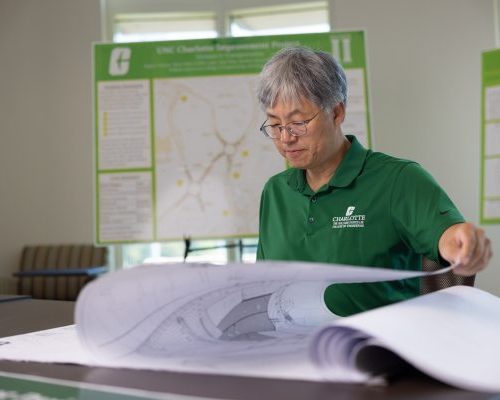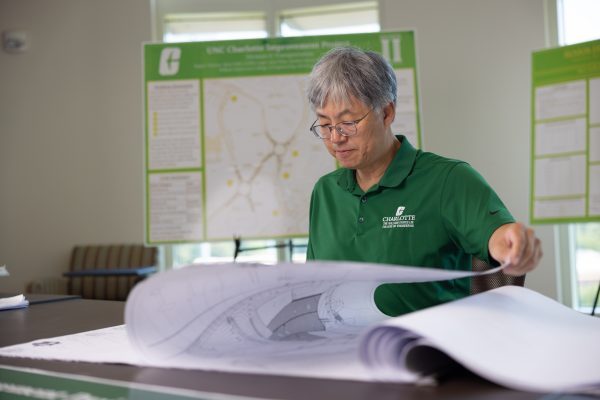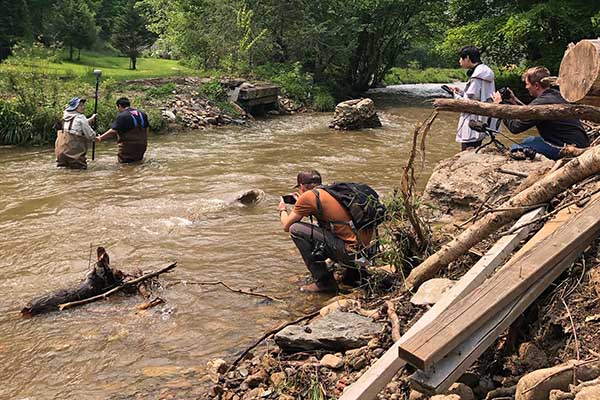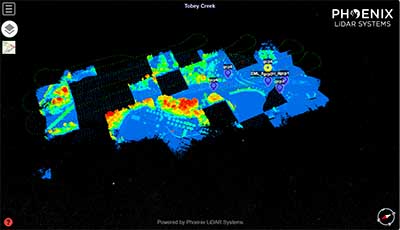Shen-en Chen: Engineer with a heart


When Shen-en Chen learned about UNC Charlotte alumni who were living through the aftermath of Hurricane Helene, he felt a strong desire to help. So, he put his civil engineering expertise to work in a way that could do the most good.
“We all saw what had happened in western North Carolina,” Chen said. “It was hearing from Emily Davis, a 2012 UNC Charlotte engineering graduate, that made it personal. She reached out because she was really trying to help her community. I thought, ‘Wow, now this about the Niner family.’”
Davis, a structural engineer, and several local residents had founded Lansing’s Bridge to Recovery, a nonprofit whose mission it is to help the residents of the mountain town of Lansing, North Carolina — and throughout Ashe County — repair or rebuild the bridges that connect their property to county highways. Washed out by the hurricane and unsupported at the time by the North Carolina Department of Transportation due to the private nature of the roads, driveways and culverts that these structures spanned, the bridges would be paid for with private funds. Davis turned to her alma mater to find solutions to help LBR reach its goals.
Human and data-based solutions
Chen’s first action was to create a bridge design course that would give undergraduate students in the William States Lee College of Engineering the opportunity to roll up their sleeves in a way that had real-life impact — and get bridges built. Thirteen students enrolled in the first cohort in January 2025 — with 17 more to come in the subsequent summer and fall semesters. “It’s a testament to the kindness of UNC Charlotte students,” he said.
“Several of the students are actually from the mountains, and they really wanted to be involved,” Chen said. “Designing a bridge was new to them; initially, some were more equipped than others to grasp the material, but over time everyone rose to the challenge.”
Three months after Helene, highways to the mountains still were not fully operational, making a student trip to the area all but impossible. Chen’s next move was collaborating with faculty colleagues and alumni from United Engineering & Consultants and Catawba Valley Engineering & Testing to develop an algorithm that puts precise information in the hands of local contracted engineers, who can apply the results to the building of additional bridges, accelerating completion.
He also connected with his campus partners in the Center for Applied Geographic Information Science in the College of Humanities & Earth and Social Sciences, with whose director, Wenwu Tang, he’d collaborated on similar disaster projects, including Hurricane Maria in Puerto Rico.

Shen-en Chen, professor of civil and environmental engineering (center photo) continues to lead student and volunteer groups in Ashe County — before the bridges students design are ready to be built and during construction. Students (left photo) survey the topography prior to design. Volunteers from Chen’s church community (right photo) have sponsored the building of a bridge and make contributions of their time.
“I knew a remote sensing system — or drones — could display the data we needed to get a sense of the geography in a geospatial way so we could accurately calculate the dimensions of the bridges we were to design,” he explained. “This exposed our undergraduate students to GIS and remote sensing technologies for the first time.”

CAGIS, an interdisciplinary research center that solves resource and sustainability problems, developed a web-based GIS dashboard specifically to support Lansing’s Bridge to Recovery’s work. Tienyang Chen (no relation to Shen-en Chen), a post doctoral scholar, led the tool’s development and the integration of drone-generated information gathered by David Dugan, a volunteer drone surveyor on the project.
“With this information, the engineering students and LBR volunteers could visualize and manage data that compares local topography before and after Hurricane Helene – and make informed decisions based on real and relevant data,” said Tienyang Chen.
Immediate and long-term rewards
When he isn’t teaching bridge design to students or devising creative ways to access information with his colleagues, Shen-en Chen has supported LBR’s mission on his own time, rallying fellow members of StoneBridge Church Community in Charlotte to sponsor the building of bridges and – when conditions improved – to volunteer with bridge demolition and construction.
“Dr. Chen has consistently and enthusiastically championed our work on and off campus,” said Davis.
A sense of empathy for the people of Lansing and LBR’s constant need to raise funds swept over him when he finally had the opportunity to visit Ashe County and see for himself the daily challenges faced by the nonprofit and the people it serves. “Not having experienced Helene myself, it was hard to sense the pain and suffering — and the persistence — of the people until I was able to see it myself,” he said. “When I solicited StoneBridge Church for support, I realized what Emily experiences every day, asking for donations to rebuild the bridges.”
Now teaching the bridge course’s third cohort — and having worked on site with students and alumni — Chen expresses appreciation for the connections the project has sparked among Niners, including how the bridge design course and its hands-on opportunities have reconnected him with his students.
“I hope all Niners know how much we value the time we spend with them.”
Written By Susan Messina
_____________________________________________________________________________________________________________________
Professor Shen-en Chen recognizes and thanks University colleagues and partners for their expertise and collaboration:
- Department of Civil and Environmental Engineering: Glenn Moglen, Bill Saunders for teaching hydraulics
- urbanCORE: Holly Middleton, associate director of engaged scholarship, for connecting to the Department of Health Psychology to explore next steps for supporting the residents of Ashe County
- Alumni: Omar Abufol ’19 ’20 M.S. and Ahmed Abufol ’18 ’19 M.S., United Engineers; David Legrand ’08 ’10 M.S., Catawba Valley Engineering for supporting the students; Michael Beigay ’01 ’05 M.S., SteelFAB, (and John Driscoll, Nucor) for donations of steel for bridge construction
- Amber Spear, professor, Tennessee State University, for partnering in bridge design for Ashe County
READ MORE ABOUT THIS PROJECT: Building Bridges: Niner engineers support a community’s recovery